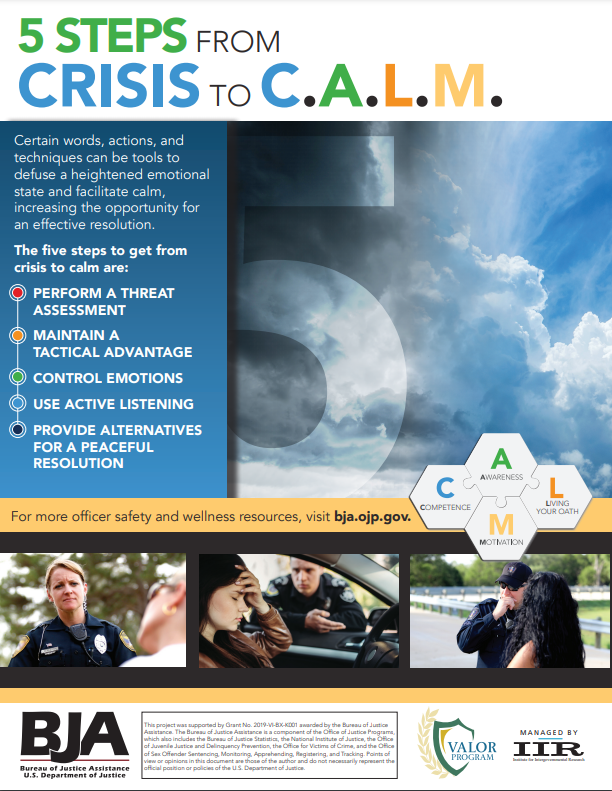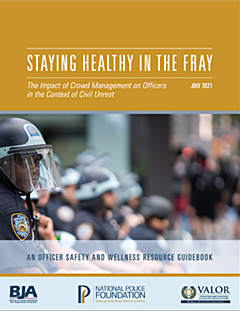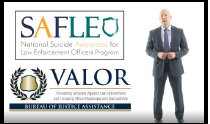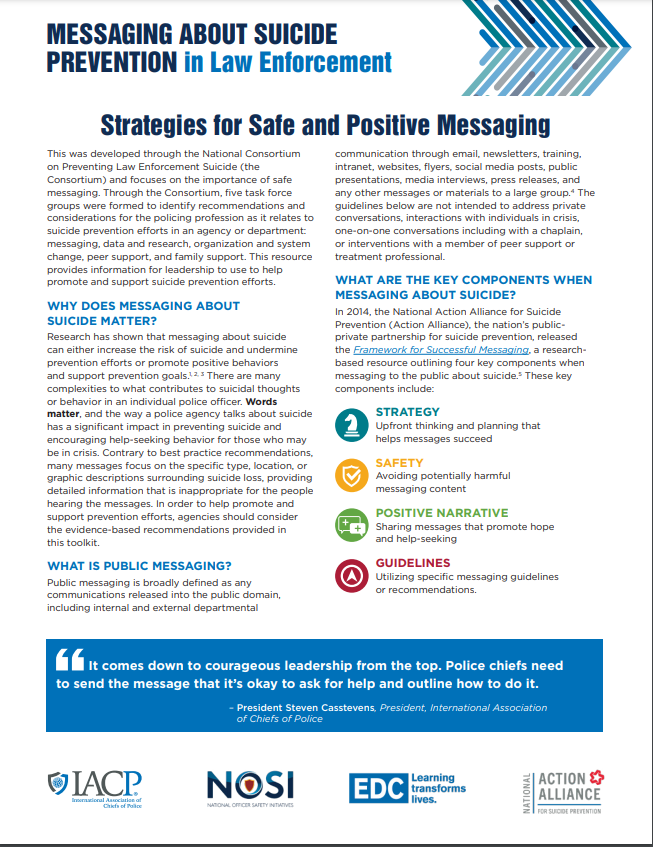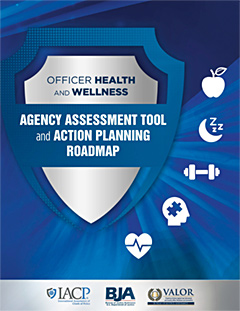The events of the past 18 months have tested the mettle and resiliency of law enforcement officers more than any other time in recent memory — perhaps in a generation. The effects of a deadly global pandemic, coupled with national outrage in response to shocking police actions, have left many officers evaluating their careers and attempting to forecast the unpredictable nature of their work conditions given this current reality. We are now seeing the toll that this radically changed policing environment is having on our officers. COVID-19 has become the leading cause of all duty-related deaths, followed by suicide.
While our nation wrestles with long overdue changes to criminal justice systems, officers continue to suit up and show up every day in the face of frustrations and dangers that most Americans may never fully understand. The everyday risks of law enforcement have always been apparent, but the resulting unseen trauma can be an even greater risk. Repeated exposure to traumatic and critical events can have long-lasting mental and physical impacts on officers and affect everyone around them, including coworkers, friends, and family.
The Bureau of Justice Assistance (BJA) is fully invested in the safety and wellness of officers, their families, and professional support staff. Our goal is to support local efforts to help ensure that officers are physically and mentally prepared to carry out their important work each and every day. We recently updated our entire safety/wellness portfolio to make it as responsive as possible to real-world issues and needs so that officers and the communities in which they serve and raise their families have safe and productive lives.
Our flagship VALOR Officer Safety and Wellness Program (VALOR Program), a partnership with the Institute for Intergovernmental Research (IIR), offers grant-funded (no-cost) training, technical assistance, and resources that focus on comprehensive officer safety and wellness, including recognizing indicators of danger, diffusing difficult situations, implementing casualty care, and mitigating the impact of stress. This is an excellent and unique resource for officers of all ranks. The VALOR Program is continuously evolving to address various issues, concerns, and trends that law enforcement officers face that affect safety, wellness, and performance. It does so while integrating the latest research, data, and practices. The program has and continues to leave its positive mark on agencies throughout the country, assisting them to enhance their organizational and individual wellness and safety.
- Our virtual suite of “leadership matchbook” courses is bringing innovative self-paced training to officers through both our executive and mid-level leadership matchbooks. These courses provide police professionals with the information and resources they need through a variety of training modules and materials and a set of guided self-examinations to take the concept of “Creating an Organizational Culture of Safety and Wellness” from a theory to a working philosophy within their areas of control/responsibility. Executives and first-line supervisors complete this course with a plan to build or enhance their organizational culture of safety and wellness.
"I would like to thank you for providing me the opportunity to participate in the VALOR Program Executive Leadership Matchbook Training… During those six weeks of training, we were tasked to enhance our ability to lead, but also to challenge ourselves to change the behaviors of how our staff view officer safety and wellness. Through self-assessments and agency audits, I was able to gain knowledge about benefits that would improve officers’ physical health and fitness, as well as their emotional wellness. These specific benefits would allow officers to: Reduce officer injuries; Reduce stress; Improve their physical ability for a healthier lifestyle.
In the next few months I will be challenging myself to set the example of becoming more physically fit, but also creating [a] healthy atmosphere where conversations can take place during roll call and security briefings about the importance of living a healthier life."
—Executive Leadership Matchbook Participant
June 2021
"I was aware that the agency had some ‘issues,’ but this course put focus on what we need to concentrate on. Just because the ship is afloat does not mean everything is okay."
—Executive Leadership Matchbook Participant
March 2021
"Highlights the small changes that an executive can make to [a]ffect the agency. It may be a small change, but this course reinforced that being intentional can make a difference."
—Executive Leadership Matchbook Participant
March 2021
- Customized technical assistance with our VALOR Program national subject-matter experts — including active and former law enforcement officers — allows agencies to receive one-on-one assistance to address issues, concerns, or needs. The types of assistance include training program reviews, agency assessments, policy recommendations, safety and wellness program design and implementation, etc. This assistance is available to all sizes and types of state, local, tribal, and territorial law enforcement agencies. Currently we are providing technical assistance to several small and rural agencies, as well as a large state police agency.
The VALOR Program also provides a wealth of online resources, from micro-trainings and roll-call trainings, to podcasts and posters for departments’ use. A suite of resources developed this past year through a partnership with IIR, our Crisis to C.A.L.M. series introduces concepts and strategies that officers can employ in response to high-stress or difficult situations that will help them make quick, informed decisions and bring calm to situations. The goal is to help officers remain calm and in control of their emotions and actions. We know that calm can be contagious, and we want it to spread to others involved in a crisis or difficult situation. Agencies are encouraged to implement the C.A.L.M. concepts of “Competence, Awareness, Living Your Oath, and Motivation” within their agencies, which can be easily done with the available resources. Agencies can:
- Introduce the five steps to go from Crisis to C.A.L.M. during roll calls with a short introductory video.
- Provide their front-line supervisors with a podcast to assist them in encouraging a new C.A.L.M. culture with their staff.
- Assign a webinar to teach C.A.L.M. to the agency’s line/patrol officers.
- Display printable posters that remind all in the agency to practice the learned concepts.
- Communicate with their community members, using an agency social media guide that includes everything needed to inform communities of the efforts that the agency and its officers are making in order to ensure that they are working to strengthen and build positive relationships with residents.
In this new policing environment, protests and mass demonstrations pose unique challenges to officer safety and wellness. To address this, BJA has partnered with the National Police Foundation on a new guide that was released last month: Staying Healthy in the Fray: The Impact of Crowd Management on Officers in the Context of Civil Unrest. This guide serves as a safety and wellness resource to frontline officers, supervisors, and law enforcement executives when responding to mass demonstrations. It offers steps that can be taken on an individual and organizational level to aid officers in preparing for, protecting colleagues and themselves, and recovering from these events.
"It's practical and comprehensive… I think that my crowd management team and I could have really used this last year."
—Crisis Response Team Officer, Aurora (CO) Police Department
"This is a really comprehensive resource that successfully lays out the science behind the problem, provides simple, but effective skills to mitigate the effects of stress, and provides guidance to supervisors and leadership on how support their people."
—Employee Support and Wellness Division Sergeant, Aurora (CO) Police Department
Resiliency among officers is needed now more than ever. BJA’s Law Enforcement Agency and Officer Resilience Training Program delivers resiliency skills training to law enforcement through a partnership with the International Association of Chiefs of Police (IACP). The goal is to build more resilient officers and agencies by enhancing knowledge and skills in resiliency to strengthen their resolve during and in the aftermath of events such as critical incidents, active-shooter events, officer-involved shootings, line-of-duty deaths, and repeated exposure to traumatic events. Several agencies have participated in the training program, having officers attend both the user course and the train-the-trainer course, allowing those agencies to train their entire staff in-house. BJA is currently assisting those agencies in implementing and conducting their own trainings.
"We, as a department, decided to participate in the VALOR project and bring in this resiliency training. We wanted to see what we could do for our officers to help them better cope with what they experience. So, looking ahead, our desire is that, obviously, we better equip our officers to deal with the traumatic incidents that they’ll see during the course of their career. What we want to do is show other departments, the benefits of this training so that they can equip their officers with the skills they need for that type of emotional survival."
—Former Deputy Chief, Norfolk (VA) Police Department
"This program taught me a different perspective and method of looking at everyday challenges that we face in law enforcement."
—Resilience Training Participant
May 2021
The suicide rate among current and former law enforcement officers is tragic and worrisome. BJA is continually seeking to learn and share information with agencies and officers to prevent suicides through our National Suicide Awareness for Law Enforcement Officers Program (SAFLEO) and the National Consortium on Preventing Law Enforcement Suicide (“National Consortium”). Both of these efforts are built around strong multidisciplinary approaches and evidence-based strategies focused on education, awareness, recognition, and prevention of law enforcement suicide. SAFLEO provides training, technical assistance, and print and online resources for agencies, officers, family members, and others on officer suicide awareness and prevention. The program offers skills and considerations that can be used to help prevent officer suicides, as well as aid in the response in the aftermath of a suicide should that tragedy occur. All of these resources are available through the SAFLEO website.
SAFLEO’s sister program, the National Consortium, brings together a group of multidisciplinary experts to focus on solutions to emerging challenges and identifying successes in addressing mental health and officer suicide prevention. Every agency and officer must be alert to help identify those who may be struggling before it’s too late. The National Consortium recently released a Comprehensive Framework for Law Enforcement Suicide Prevention and a practical toolkit to help agencies do just that, and more. It provides tools for agencies such as:
- Guidance on how to message about suicide prevention in law enforcement
- Information on the powerful benefits of peer support programs
One of our newest resources was developed through a partnership with IACP to help agencies of any size or makeup develop or enhance a safety and wellness program that is responsive to current times and issues. The Officer Health and Wellness Agency Assessment Tool and Action Planning Roadmap is a guide that includes various approaches to help agencies determine what will work best for their situation and personnel. Using the 10 steps explained within the resource, agencies have a clear path of actionable items and considerations at their fingertips to assist them in building a comprehensive officer health and wellness program. This tool addresses a variety of factors, from obtaining necessary buy-in to evaluating the impact of the program.
We continue to be amazed at the resiliency and determination of officers to do their very best in the face of uncertainty and change. For our part, BJA will continue to advance work that promotes safety and wellness, protects the public from crime and evolving threats, and builds trust between law enforcement and the community.


